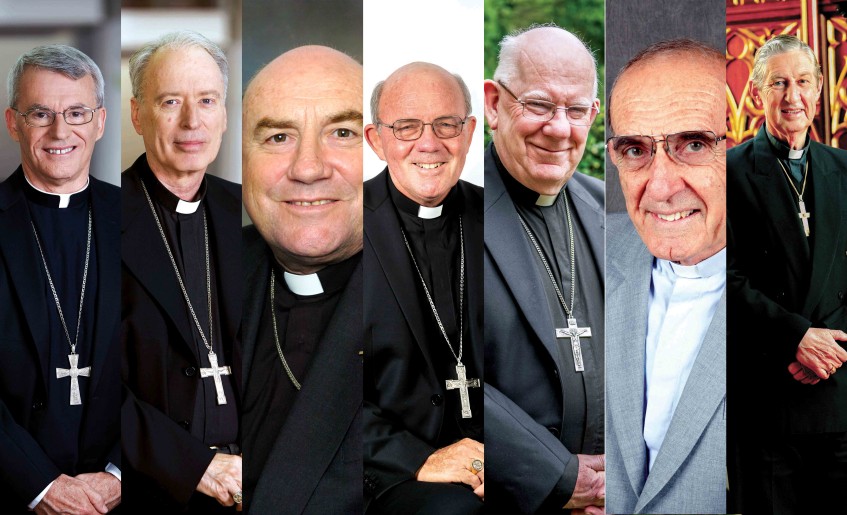WA Bishops speak out to support life

The seven Bishops of Western Australia - Archbishop Timothy Costelloe and Auxiliary Bishop Sproxton of Perth, Bishop Christopher Saunders of Broome, Bishop Michael Morrissey of Geraldton, Bishop Gerard Holohan of Bunbury, as well as Emeritus Archbishop Barry Hickey of Perth and Emeritus Bishop Justin Bianchini of Geraldton - have this weekend released a statement about the current debate of doctor-assisted suicide and euthanasia in WA. Photos: Sourced.
By Jamie O’Brien
The seven Bishops of Western Australia have recently called on the WA Government to take the ethically and socially right road towards better and more accessible end-of-life care, and not to take the easy road of voluntary assisted dying.
Voluntary assisted dying, the Bishops said, does not take suffering away except by taking the suffering person away.
In a statement released Tueday 20 November, the seven Bishops – Archbishop Timothy Costelloe and Auxiliary Bishop Sproxton of Perth, Bishop Christopher Saunders of Broome, Bishop Michael Morrissey of Geraldton, Bishop Gerard Holohan of Bunbury, as well as Emeritus Archbishop Barry Hickey of Perth and Emeritus Bishop Justin Bianchini of Geraldton have spoken extensively about the current debate of doctor-assisted suicide and euthanasia in WA.
“Voluntary assisted dying is never a purely individual choice: it is always a social choice that requires and demands other people to cooperate,” the statement says.
“It always affects other people.
“Every decision we make, no matter how private it may appear to be, does in fact impact on others precisely because we are not isolated individuals but people who live in a family, a community, a society.
“The myth of “it’s my life, it’s my choice” completely ignores this reality.
The WA Government announced in early November that they will soon introduce a bill to Parliament to legalise voluntary assisted suicide for patients suffering from a terminal illness.
The announcement comes following the recommendations from the Joint Select Committee on End of Life Choices, outlined in its August report 'My Life, My Choice'.
The Panel will be chaired by Malcolm McCusker QC, former Governor of Western Australia, and will report to the Minister for Health. The panel of 11 members is comprised of leading health professionals, health consumers and legal experts.
However, the statement from the WA Bishops explained that voluntary assisted dying in either form represents a radical breach in the universal prohibition on one person killing another.
“This prohibition sits at the heart of every civilised society.
“The right to life is the ‘sine qua non’ of all human rights: to risk or relativise it would be to undermine the foundation of every other right we enjoy.”
In an exclusive interview with The Record, Archbishop Costelloe reiterated that respect for human life from conception to natural death is of utmost importance, describing it as a fundamental pillar of the Catholic understanding of what it means to be human.
“Every other human right ultimately becomes groundless if this absolute right to life is compromised,” he explained.
“I am not trying to disguise the fact that the Church's position, as well as encompassing real concerns about the likely outcomes of the proposed legislative changes, is deeply grounded in our religious conviction that life is a precious gift from God which no-one has the right to terminate.
Archbishop Costelloe added that decisions individuals make about their desire to determine the time and manner of their death have implications beyond their own lives.
He added that once the ‘right’ to end one’s life is established and legislated for, it only opens up further questions.
“It becomes possible to ask if and under what circumstances others might have the ‘right’ or even the ‘obligation’ to end someone's life.
“It also becomes possible to ask if a person has not only the ‘right’ but sometimes the ‘duty’ to end their life,” Archbishop Costelloe said.
“This is the slippery slope argument, dismissed by some as a scare tactic.”
Archbishop Costelloe said in countering this, some suggest enshrining suitable ‘safeguards’ in legislation.
“It is not scare-mongering to ask if future legislation might include severely physically disabled people, those suffering distressing and degenerative neural conditions such as dementia, and infants whose medical conditions are incurable, though not life-threatening.”
Archbishop Costelloe concluded by saying that the solution lies not in more legislation, but the increase in the availability of palliative care services and facilities to help support both the dying and their loved ones.
“All of us - governments, churches, institutions, families, and individuals must accept this responsibility to truly care for and support people throughout their lives, and especially as they come close to death.
“In this sense, the question about voluntary euthanasia is part of a much wider issue of our society's capacity to care for all human life,” he concluded.
